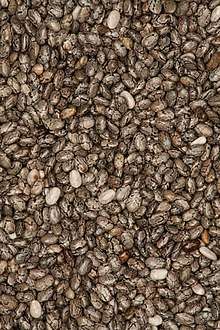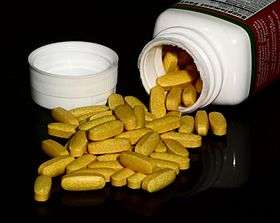Nutraceutical
A nutraceutical or 'bioceutical' is a pharmaceutical alternative which claims physiological benefits.[1][2] In the US, "nutraceuticals" are largely unregulated, as they exist in the same category as dietary supplements and food additives by the FDA, under the authority of the Federal Food, Drug, and Cosmetic Act.[3] [4]

Regulation
Nutraceuticals are treated differently in different jurisdictions.
Canada
Under Canadian law, a nutraceutical can either be marketed as a food or as a drug; the terms "nutraceutical" and "functional food" have no legal distinction,[5] referring to "a product isolated or purified from foods that is generally sold in medicinal forms not usually associated with food [and] is demonstrated to have a physiological benefit or provide protection against chronic disease."
United States
The terms "nutraceutical" and 'bioceutical' are not defined by US law.[6] Depending on its ingredients and the claims with which it is marketed, a product is regulated as a drug, dietary supplement, food ingredient, or food.[7][8]
International sources
In the global market, there are significant product quality issues.[9] Nutraceuticals from the international market may claim to use organic or exotic ingredients, yet the lack of regulation may compromise the safety and effectiveness of products. Companies looking to create a wide profit margin may create unregulated products overseas with low-quality or ineffective ingredients.
Market
A market research report produced in 2018 projected that the worldwide nutraceuticals market would account for over US$ 80,700 million in 2019,[10] defining that market as "Dietary Supplements (Vitamins, Minerals, Herbals, Non-Herbals, & Others), and Functional Foods & Beverages".
Classification of nutraceuticals
Nutraceuticals are products derived from food sources that are purported to provide extra health benefits, in addition to the basic nutritional value found in foods. Depending on the jurisdiction, products may claim to prevent chronic diseases, improve health, delay the aging process, increase life expectancy, or support the structure or function of the body.[11]
Dietary supplements

In the United States, the Dietary Supplement Health and Education Act (DSHEA) of 1994 defined the term: “A dietary supplement is a product taken by mouth that contains a "dietary ingredient" intended to supplement the diet. The "dietary ingredients" in these products may include: vitamins, minerals, herbs or other botanicals, amino acids, and substances such as enzymes, organ tissues, glandulars, and metabolites. Dietary supplements can also be extracts or concentrates, and may be found in many forms such as tablets, capsules, softgels, gelcaps, liquids, or powders.”[12]
Dietary supplements do not have to be approved by the U.S. Food and Drug Administration (FDA) before marketing, but companies must register their manufacturing facilities with the FDA and follow current good manufacturing practices (cGMPs). With a few well-defined exceptions, dietary supplements may only be marketed to support the structure or function of the body, and may not claim to treat a disease or condition, and must include a label that says: “These statements have not been evaluated by the Food and Drug Administration. This product is not intended to diagnose, treat, cure, or prevent any disease.” The exceptions are when the FDA has reviewed and approved a health claim. In those situations the FDA also stipulates the exact wording allowed.
Functional foods

Functional foods are fortified or enriched during processing and then marketed as providing some benefit to consumers. Sometimes, additional complementary nutrients are added, such as vitamin D to milk.
Health Canada defines functional foods as “ordinary food that has components or ingredients added to give it a specific medical or physiological benefit, other than a purely nutritional effect.”[13] In Japan, all functional foods must meet three established requirements: foods should be (1) present in their naturally occurring form, rather than a capsule, tablet, or powder; (2) consumed in the diet as often as daily; and (3) should regulate a biological process in hopes of preventing or controlling disease.[14]
History
The word "nutraceutical" is a portmanteau of the words "nutrition" and "pharmaceutical", coined in 1989 by Stephen L. DeFelice, founder and chairman of the Foundation of Innovation Medicine.[15] Indians, Egyptians, Chinese, and Sumerians are just a few civilizations that have used food as medicine.[16] “Let food be thy medicine.” is a common misquotation [17] attributed to Hippocrates, who is considered by some to be the father of Western medicine.
The modern nutraceutical market began to develop in Japan during the 1980s. In contrast to the natural herbs and spices used as folk medicine for centuries throughout Asia, the nutraceutical industry has grown alongside the expansion and exploration of modern technology.[18]
Criticism
Because nutraceuticals and bioceuticals are largely unregulated, these supplements are the subject of more of marketing hype than actual clinical testing, and for many, it is not even yet known whether they provide more benefits than risks for consumers.[19] For many of these products, the most compelling evidence for efficacy remains anecdotal or, at best, based on hints of benefit from small or poorly controlled studies. And when their claims do not match the evidence, there can be legal consequences. After scientists disputed the benefits of nutraceuticals like probiotics in Dannon yogurt, the company was forced to pay millions for falsely claiming its products Actimel and Activia boosted the immune system.[20] Steven Nissen, chairman of cardiology at the Cleveland Clinic, said, "The concept of multivitamin supplements was sold to Americans by an eager nutraceutical industry to generate profits. There was never any scientific data supporting their usage."
See also
- Health claims on food labels
- Cosmeceutical for cosmetic products with quasi-medicinal claims
- Probiotic
References
- Sarris, Jerome; Murphy, Jenifer; Mischoulon, David; Papakostas, George I.; Fava, Maurizio; Berk, Michael; Ng, Chee H. (2016). "Adjunctive Nutraceuticals for Depression: A Systematic Review and Meta-Analyses". American Journal of Psychiatry. 173 (6): 575–587. doi:10.1176/appi.ajp.2016.15091228. ISSN 0002-953X. PMID 27113121.
- Banach, Maciej; Patti, Angelo Maria; Giglio, Rosaria Vincenza; Cicero, Arrigo F.G.; Atanasov, Atanas G.; Bajraktari, Gani; Bruckert, Eric; Descamps, Olivier; Djuric, Dragan M.; Ezhov, Marat; Fras, Zlatko; von Haehling, Stephan; Katsiki, Niki; Langlois, Michel; Latkovskis, Gustavs; Mancini, G.B. John; Mikhailidis, Dimitri P.; Mitchenko, Olena; Moriarty, Patrick M.; Muntner, Paul; Nikolic, Dragana; Panagiotakos, Demosthenes B.; Paragh, Gyorgy; Paulweber, Bernhard; Pella, Daniel; Pitsavos, Christos; Reiner, Željko; Rosano, Giuseppe M.C.; Rosenson, Robert S.; et al. (2018). "The Role of Nutraceuticals in Statin Intolerant Patients". Journal of the American College of Cardiology. 72 (1): 96–118. doi:10.1016/j.jacc.2018.04.040. PMID 29957236.
- "Supplement Makers Touting Cures for Alzheimer's and Other Diseases Get F.D.A. Warning". The New York Times. 11 February 2019. Retrieved 2019-05-11.
- "Labeling & Nutrition". The Food and Drug Administration, US Department of Health and Human Services. 5 October 2016. Retrieved 2016-10-11.
- "Nutraceuticals / Functional Foods and Health Claims on Foods: Policy Paper". Health Canada. June 24, 2013. Retrieved January 30, 2014.
- Staff, FDA. Last updated March 29, 2013. Food Labeling & Nutrition Overview.
- Staff, FDA. Last Updated March 27, 2013. Q&A - Dietary Supplements
- Committee on the Framework for Evaluating the Safety of the Dietary Supplements (2005). "Committee Change". Dietary Supplements: A Framework for Evaluating Safety. Institute of Medicine. p. 21. doi:10.17226/10882. ISBN 978-0-309-09110-7. PMID 25009855.
- Hasler, Clare M. (2005). Regulation of Functional Foods and Nutraceuticals: A Global Perspective. IFT Press and Blackwell Publishing. ISBN 978-0-8138-1177-2.
- GLOBE NEWSWIRE Dec. 18, 2018. / Herbal Nutraceutical Supplements in Vogue as Consumer Preference for Natural Soars - Fact.MR
- Nutraceuticals/Functional Foods and Health Claims on Foods
- "Overview of Dietary Supplements". Fda.gov. Retrieved 2011-06-03.
- "Glossary - Biotechnology". Hc-sc.gc.ca. 2006-03-23. Retrieved 2011-06-03.
- Hardy, G (2000). "Nutraceuticals and functional foods: introduction and meaning". Nutrition. 16 (7–8): 688–9. doi:10.1016/S0899-9007(00)00332-4. PMID 10906598.
- Kalra EK (2003). "Nutraceutical-definition and introduction". AAPS PharmSci. 5 (3): 27–28. doi:10.1208/ps050325. PMC 2750935. PMID 14621960.
- Wildman, Robert E. C., ed. (2001). Handbook of Nutraceuticals and Functional Foods (1st ed.). CRC Series in Modern Nutrition. ISBN 978-0-8493-8734-0.
- Cardenas, Diana (2013). "Let not thy food be confused with thy medicine: The Hippocratic misquotation". e-SPEN Journal.
- Shibamoto, Takayuki; Kanazawa, Kazuki; Shahidi, Fereidoon; et al., eds. (2008). Functional Food and Health. ACS Symposium. p. 993. ISBN 978-0-8412-6982-8.
- Hayden, Thomas (August 2012). "Scientific American". Scientific American. doi:10.1038/scientificamerican1207-38sp.
- "Dannon Pays Millions Over False Yogurt Claims". Canadian Broadcasting Corporation. December 2010.
Further reading
- Books
- Pathak, Y.V. (editor, 2010). Handbook of Nutraceuticals(vol. 1): Ingredients, Formulations, and Applications. CRC Press. ISBN 978-1-4200-8221-0
- Shahidi, F. / Naczk, M. (eds. 2003). Phenolics in Food and Nutraceuticals (2nd edition). CRC Press. ISBN 978-1-58716-138-4
- Shahidi, F. / Weerasinghe, D.K. (eds. 2004). Nutraceutical Beverages: Chemistry, Nutrition, and Health Effects. American Chemical Society. ISBN 978-0-8412-3823-7
- Review articles on possible health benefits
- Aggarwal, B.B. et al. “Molecular Targets of Nutraceuticals Derived from Dietary Spices: Potential Role in Suppression of Inflammation and Tumorigenesis”, Experimental Biology and Medicine (2009),234(8):825-849.
- Gupta, S.C. et al. ” Regulation of survival, proliferation, invasion, angiogenesis, and metastasis of tumor cells through modulation of inflammatory pathways by nutraceuticals“, Cancer Metastasis Reviews (2010),29(3):405-434.
- Kannappan, R. et al. “Neuroprotection by Spice-Derived Nutraceuticals: You Are What You Eat!”, Molecular Neurobiology (2011),44(2):142-159.